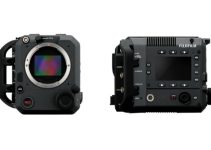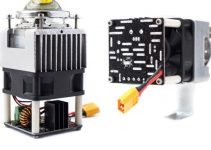Every one of us has seen at least one time a GorillaPod. Those little tripods made of small balls, able to bend and shape itself as needed have been in the backpack of quite every traveling filmmaker in the world. Light and pretty useful, who could think of something better, right? Well, what we have here may not be better, but it’s sure interesting.
Apart from some takes in the classic tripod form, like the Manfrotto Befree that improves the materials rather than the design, there haven’t been many attempts to innovate the light and travel-y tripod. This one seems to be a good one, so let’s take a look while Armando Ferreira demonstrates the uses of the SwitchPod.
So, first of all, let’s ask the big question: What is a SwitchPod? The SwitchPod is a small tripod that folds itself and collapses uniting the three legs in a single arm that you can use to pick up the camera and maneuver it, be it in selfie/vlog mode or as a kind of small jib. The aim is to allow the switch between a vlogging position to a tripod one in a few seconds.
If you’ve used a Gorillapod in the past, on the other hand, you will surely know its strengths, but also its weaknesses. You can adjust it to almost any position, go down low, attach it to a pole or twist it to follow the uneven ground, but getting from one mode to the other requires a lot of tinkering.
And, this is done at the expense of the overall resistance of the GorillaPod itself. If the camera is too heavy or ill-balanced, the Gorillapod will slowly bend and it could lead to the camera falling off.
The Switchpod instead has this sturdy metal legs that will not bend or move in any way at all and is overall lighter and easier to take around. Once collapsed it takes virtually no space at all in the bag, while the GorillaPod is with no doubt bulkier.
All of this is not to say that the GorillaPod is a bad product whatsoever. Trying to attach a camera to the branch of a tree, on a stone or any other uneven surface while you’re having a hike in the mountains, or just a simple tourist weekend in a nice city, is a big feature, one that can’t be easily achieved with the SwitchPod.
One nice touch on the SwitchPod is that it has two quarter-inch screw holes on the legs, allowing to mount on the Switchpod itself some accessories, like an external monitor, a small light, or just in case whatever other rig you may have laying around. Moreover, the frame has plenty of space where you can slide a clip, a rope, or just a simple carabiner so to keep it always on hand while walking around.
As we see in the video, going from having a camera and SwitchPod both attached on your body yo the camera on top of the Pod, takes a seemingly impossible 5/7 seconds. Last but not least, the screw on top of the SwitchPod allows to attach a ball head similar to the one on the Gorillapod (actually you could use exactly the same!) and that makes up for some of those “uneven ground” situations.
So what would you choose between the two? Actually, it seems like one does not exclude the other, and their user case scenario is actually quite different. The GorillaPod is a well-known tool, it has been around for a while, and offers a great versatility allowing to adapt to almost any kind of situation but requires a little more time and effort to be set up and may not always be completely safe.
The SwitchPod, on the other hand, is a Kickstarter project, and a month away from the end of founding at the moment of writing, and seems to be a tool that covers a less wide scenario but excels when out to good use. It has a much superior payload and stability, we can see it support cameras and lenses that would be simply not possible to rig on the Gorillapod.
So, as often happens it seems that there is not a clear answer to the question, instead, it depends on the kind of use you’re going to need it for. So, what are you going to choose? Let us know in the comments!
[source: Armando Ferreira]
Order Links:
Joby GorillaPod 3K Flexible Mini-Tripod with Ball Head Kit (B&H, Amazon)
Disclaimer: As an Amazon Associate partner and participant in B&H and Adorama Affiliate programmes, we earn a small comission from each purchase made through the affiliate links listed above at no additional cost to you.



